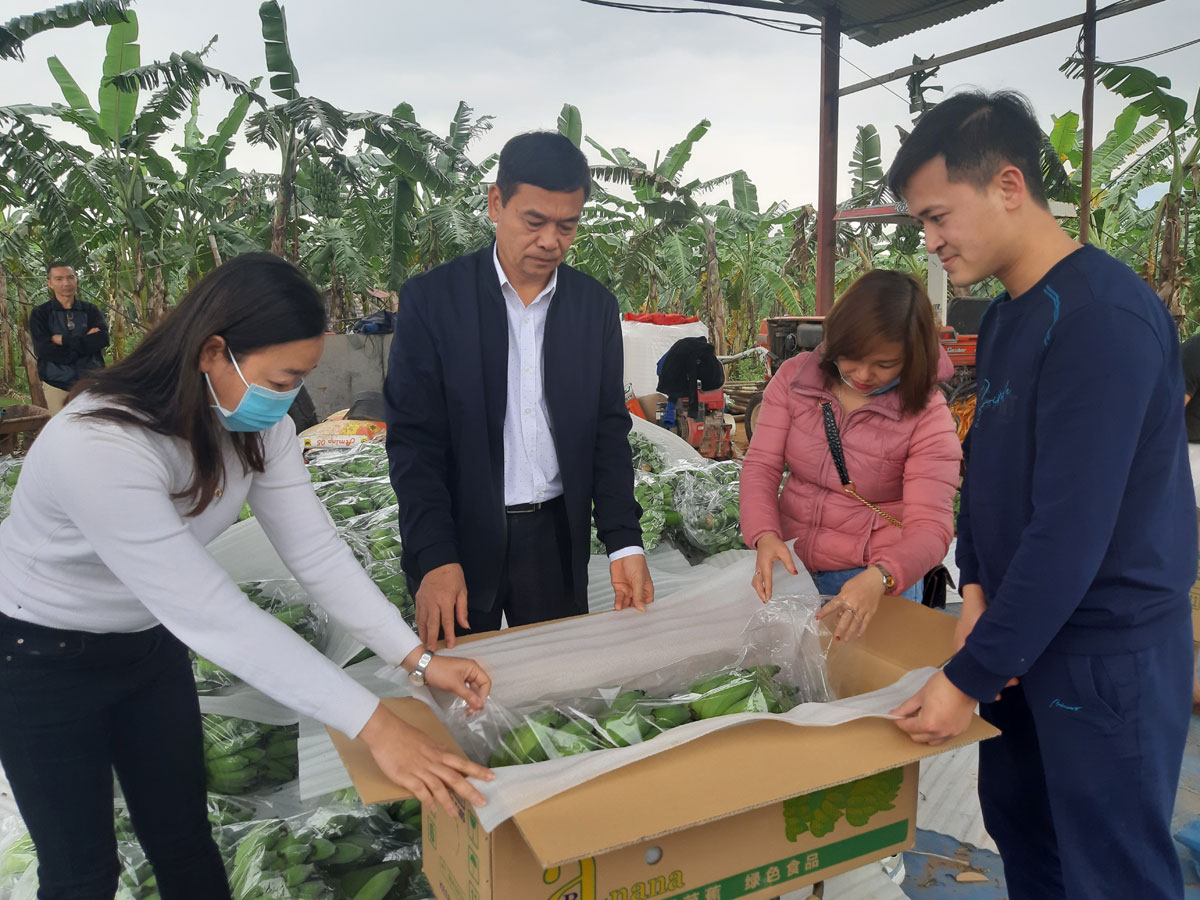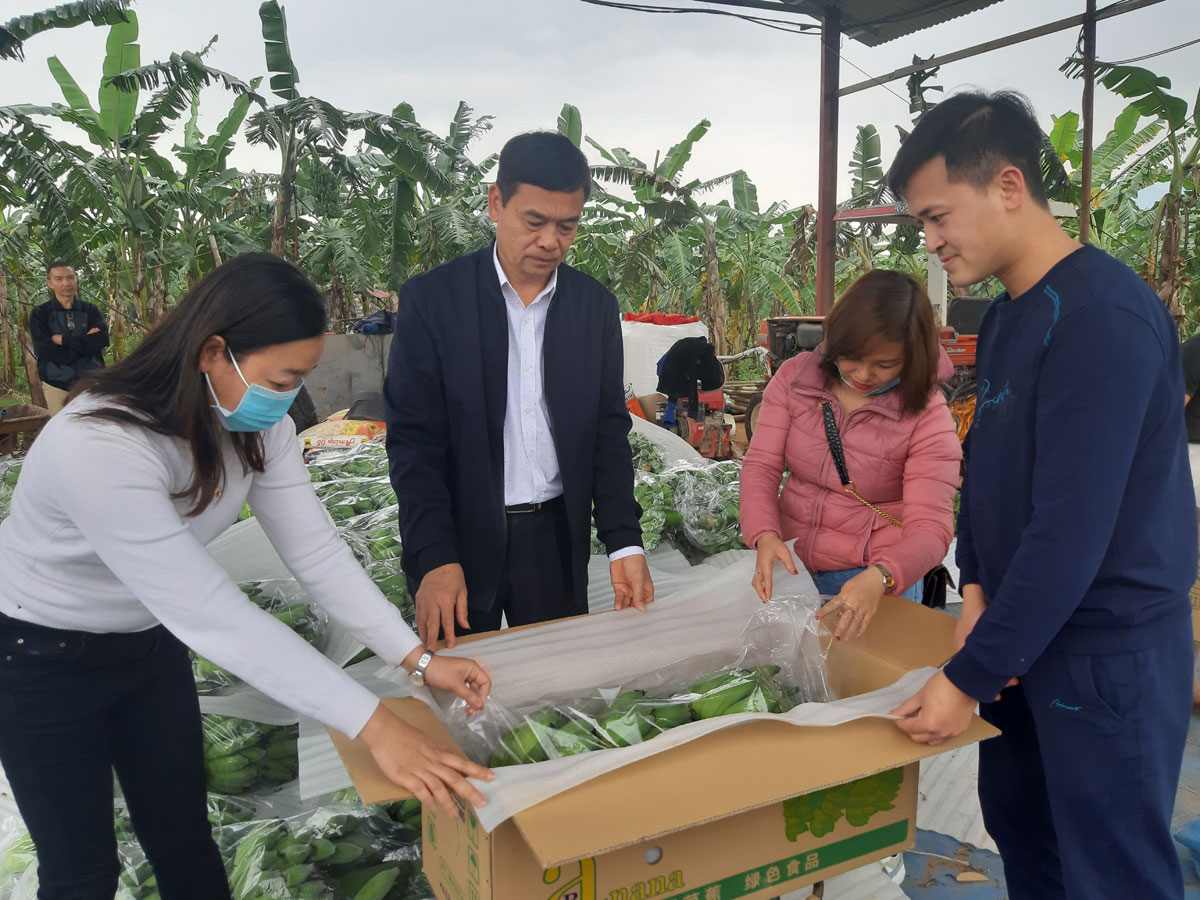
(HBO) - The Phu Cuong – Song Da agro-fishery product processing and producing co-operative in Thinh Minh commune in Hoa Binh city on March 22 shipped 20 tonnes of banana with growing-area codes to China. This is the first shipment of the co-operative in this year after COVID-19 broke out.
 A member of co-operative packs banana for
exports.
A member of co-operative packs banana for
exports.
The co-operative
specialising in agriculture has about 25 ha under banana trees, yielding 750
tonnes per year. In 2021, it is set to export 800 tonnes of the fruit to China.
The
production, processing and packaging are carried out under VietGap standards
and ensure food safety.
The
issuance of codes for fruit-growing area is stipulated in Article 64 of the Law
on Crop Production (Law No. 31/2018/QH14), which took effect on January 1,
2020. To receive such codes, the growing areas must satisfy various requirements.
Plants must
be grown in suitable areas and locatable. They have to be of the same variety
and taken care of under identical process to be able to resist diseases.
Farm log is
needed to keep track on the use of pesticide. The areas are also recognised to
have applied Good Agricultural Practices (GAP).
Alongside
codes for growing areas, there are codes for packaging facilities, a
requirement for phytosanitary implementation.
Some
localities in the north have been successful in using the codes for areas
growing longan, lychee, banana, watermelon and dragon fruit for exports, namely
Hai Duong and Bac Giang.
In Hoa
Binh, activities on the granting of codes for growing areas and packaging sites
have been piloted since 2019.
To date,
nine zones with a combined area of 76.3 ha and seven packaging facilities have
received such codes. In 2020, some 120 tonnes of Son Thuy longan in Kim Boi
district and 180 tonnes of banana of Hoa Binh city were officially shipped to
the northern neighbour./.
According to data from the Hoa Binh Provincial Party Committee, the industrial production index for the first six months of 2025 is estimated to have increased by 20% compared to the same period last year. This marks the highest year-on-year growth rate for this period since 2020.
In the first six months of 2025, Hoa Binh province’s export turnover was estimated at 1.145 billion USD, marking an 18.11% increase compared to the same period in 2024. Import turnover was estimated at $ 804 million, a 17.15% increase, which helped the province maintain a positive trade balance.
The lives of the ethnic minority farmers in Tan Lac district have gradually improved thanks to the new directions in agricultural production. This is a testament to the collective strength fostered through the professional associations and groups implemented by various levels of the district’s Farmers’ Union.
With the motto the "product quality comes first,” after nearly one year of establishment and operation, Muong village’s Clean Food Agricultural and Commercial Cooperative, located in Cau Hamlet, Hung Son Commune (Kim Boi district), has launched reputable, high-quality agricultural products to the market that are well-received by consumers. The products such as Muong village’s pork sausage, salt-cured chicken, and salt-cured pork hocks have gradually carved out a place in the market and they are on the path to obtaining the OCOP certification.
In the past, the phrase "bumper harvest, rock-bottom prices" was a familiar refrain for Vietnamese farmers engaged in fragmented, small-scale agriculture. But today, a new spirit is emerging across rural areas of Hoa Binh province - one of collaboration, organisation, and collective economic models that provide a stable foundation for production.
Maintaining growing area codes and packing facility codes in accordance with regulations is a mandatory requirement for agricultural products to be eligible for export. Recently, the Department of Agriculture and Environment of Hoa Binh province has intensified technical supervision of designated farming areas and packing facilities to safeguard the "green passport" that enables its products to access international markets.



 A member of co-operative packs banana for
exports.
A member of co-operative packs banana for
exports.